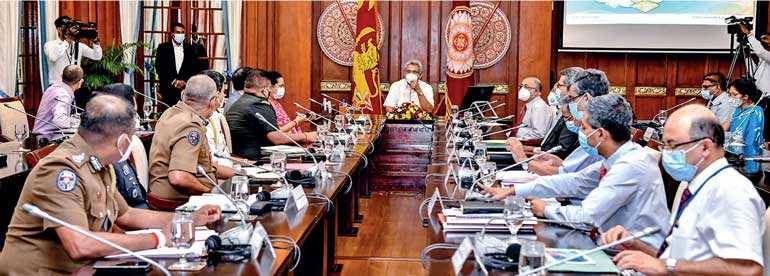Saturday Feb 21, 2026
Saturday Feb 21, 2026
Friday, 13 November 2020 00:00 - - {{hitsCtrl.values.hits}}

As the pandemic started to spread in the closing months of 2019 and as its dangers became better known in January and February of 2020, all countries prepared to shield their population from the dangers of the then, little known, novel coronavirus. Yet, no country has escaped the brunt of the pandemic totally. It is believed that a lot of the earlier mistakes could have been avoided, if the dangers of groupthink were better known
Today, all countries are combating the global COVID-19 pandemic. Even after a 10-month war on the virus, much of the Western world is being forced back into trauma-provoking, mind-numbing, anger- inducing lock downs, again. It is certain today, that only the eventual availability of a successful vaccine will offer an ultimate victory.
inducing lock downs, again. It is certain today, that only the eventual availability of a successful vaccine will offer an ultimate victory.
While, with God’s grace, Maldivians hope and pray, that the worst is behind us, and as we cautiously open up for tourism, our neighbourly brothers and sisters, friends and business partners in Sri Lanka are facing rough weather and turbulent seas.
This article about the dangers of groupthink, in its initial form, was originally written and published in Volume 2, Issue 1 of the Maldives Economic Review (mer.mv) and referred to the unfortunate consequences of groupthink in the context of Maldives.
Yet, groupthink is a social phenomenon that afflicts all manner of groups- large or small, business or social, in countries big or small. When groupthink sets in, the group holds itself rigid and unbending. They find themselves unable to brook any opposition to its conclusions and any opinions to the contrary are rejected and ridiculed.
The concept of groupthink, how it manifests itself and its dangers are part of the wider literature of management for close to half a century now. Yet, alarmingly, even while one would expect such an important phenomenon to be part of the common parlance in task forces formed to offer policy recommendations to combat a global pandemic, the concept of groupthink is little understood, if at all.
The hurt, and injury to the citizenry and the economy of all countries resulting from, what is in hindsight, evidence of unfortunate decisions taken by highly eminent, professionally qualified and no doubt well-meaning professionals, have now been well documented.
This article therefore, in this revised format, sets to explore the dangers of groupthink and how the effects can hurt and injure a population, any population, because of the many unhealthy ways in which groupthink manifests itself, anywhere, in any country, any part of the world.
What is groupthink and how does it manifest itself?
In 1972 American Social Psychologist Irving L. Janis coined the term groupthink to refer to the phenomenon where people working within a group strive for consensus by adopting the perceived opinions of the rest of the group while muting their own opinions for fear of disrupting group dynamics.
Janis’s classic original study published in 1972 titled ‘Victims of Groupthink: A Psychological Study of Foreign-Policy Decision and Fiascoes’, went onto demonstrate the horrific effect of groupthink that led to major world disrupting events like the failure to anticipate the Japanese attack on Pearl Harbour (1941) leading to the US entry to World War II; the Bay of Pigs Invasion fiasco, financed and directed by the US which landed 1,500 Cuban on the south western Coast of Cuba in 1961; and the prosecution of the Vietnam War started by the then President Johnson with an estimated cost more than $ 843 billion, the lives of more than 50,000 US soldiers, two million deaths in Vietnam and a war effort that dragged on for three years from 1964 to 1967.
There has been many published and verified incidents of groupthink leading groups of people to take decisions which none would have taken individually. One of the best and most commonly cited is ‘The Abilene Paradox’ introduced by Jerry B. Harvey in 1974. In Harvey’s, today famously example, a family takes a miserable car trip during a hot summer day even though none of them, individually, wanted to go. It highlights how easily groupthink can set in and lead to faulty and miserable decisions within a group.
Perhaps of most significance and important to note is that the phenomenon of groupthink is today identified in all sorts of groups ranging from small family units, national security apparatus, to small and large business companies as well as within social settings and informal groupings. It is today a commonly known and understood phenomenon and is extensively taught in managerial, administrative, and similar courses across universities and colleges in all parts of the world.
In 2010 James Montier published a book titled ‘The Little Book of Behavioural Investing: How To Be Your Own Worst Enemy’ in which he outlined the following eight easily identified symptoms of groupthink.
1. Illusions of invulnerability leading members of the group to be overly optimistic and engage in risk-taking.
2. Unquestioned beliefs leading members to ignore possible moral problems and ignore the consequences of individual and group actions.
3. Rationalising, which prevents members from reconsidering their beliefs and causes them to ignore warning signs.
4. Stereotyping; leading members of the in-group to ignore or even demonise out-group members who may oppose or challenge the group’s ideas.
5. Self-censorship causing people who might have doubts to hide their fears or misgivings.
6. ‘Mindguards’ acting as self-appointed censors to hide problematic information from the group.
7. Illusions of unanimity leading members to believe that everyone agrees and feels the same way.
8. Direct pressure to conform is often placed on members who pose questions, and those who question the group are often seen as disloyal or traitorous.
Groupthink paves the dynamics to allow the most outspoken, often the most extrovert person to take over the group and silent the most knowledgeable and the most experienced, especially if such persons are introverts.
Once groupthink is cemented, unanimity is assumed and never questioned. There’s pressure to confirm and members feel infallible. Of special concern is that once group dynamics set in, the voice and the opinions of outsiders, regardless of how educated and knowledgeable they may be, are not only effectively snubbed but also roundly disregarded and often derided.
The dangers of groupthink and the effort to combat COVID-19
As the pandemic started to spread in the closing months of 2019 and as its dangers became better known in January and February of 2020, all countries prepared to shield their population from the dangers of the then, little known, novel coronavirus. Doctors, epidemiologists, public health professional and academics were brought together in groups under different names in different countries.
Yet, no country has escaped the brunt of the pandemic totally. Even New Zealand; hailed as the model of caution and success, lost 25 citizens, which I am sure all New Zealanders will agree, is 25 too many.
Other countries have done worse. Far worse. Mistakes were made, rectified, and new blunders and slip-ups made. The public were put under trauma and injury due to, well intentioned, yet ultimately unsuccessful and faulty lockdown models, contact tracing procedures and testing arrangements.
It is believed that a lot of the earlier mistakes could have been avoided, if the dangers of groupthink were better known. If leaders, as they formulated the groups to combat the effort had, even cursively, taken heed of the dangers of groupthink.
How does one avoid the dangers of groupthink? Firstly, by making sure the composition of the group, at formation is diverse and include those of a variety of personality types including those who are inclined to question and comment. To let it be known to the group, that their determinations will not only be questioned and criticised but will also be peer tested and that the group should stand ready to face and defend their decisions. By encouraging others, including the media to play its relevant role in probing and questioning the consensus from within.
Here in the Maldives, the effort was led by a team of dedicated professionals; a multisector set-up bringing in the top officials from all relevant state institutions.
We shall pause here and applaud the tireless and heroic effort of the global team of front-line workers- the doctors, the nurses, the lab technicians, and the paramedics among others. The physical fatigue and emotional distress they are subject to for months on end now and thank them for their continued effort.
However, here in Maldives too, the effect of groupthink soon started to manifest itself and became evident in the way the authorities acted and reacted. The group of professionals soon was seen to be rigid and brooked no second opinions or afterthought. Well meant, advice, guidance and suggestions from experienced senior physicians and public health experts were firstly ignored, then derided including in social media.
The writer is a columnist both in his native language Dhivehi and in English. He does a regular column on mostly economic related issues in the Maldives. His articles have been previously published on the Daily FT where he is a guest columnist and is the Maldivian Economic and Business Correspondent.
This was a pandemic like no other. Nobody had a perfect rule book. The rulebook was being written as authorities throughout the world lived and learnt. But this is precisely why, rigidity in approach and inelasticity in practice was so very unhelpful and dangerous at this juncture. Yet, serious concerns raised by many a commentator and experienced professionals were ignored and rejected.
Groupthink relating to a family car trip with unhappy consequences is, of course not something to be ignored. But groupthink, when a country, any country, is fighting a widespread and dangerous pandemic, while there is no rulebook, is of a totally different dimension.
All this is in no way to demean the effort of the authorities. There is no doubting that they fought hard and tirelessly. But this is an attempt, to raise the awareness of the dangers of groupthink to the forefront. To help individuals, institutions, NGOs and finally for states to be aware of, first the prevalence of this animal called groupthink and then raise the awareness of the dangers of the beast.
That regardless of the intentions or the type of people involved, the beast of groupthink is bound to rear its head with unfortunate consequences whenever groups come together. That the dangers of groupthink, can be that much more dire and of greater consequence when tackling a national public hazard. Not just to know about the dangers of groupthink, but also to learn of the critical importance in taking pre-emptive steps to prevent it or to reduce its impact.
The age of seers and prophets have left us by. There is no one person, or any one group who knows and will know the absolute perfect path. While professionals will do it better, they too, need to be aware of the dangers of groupthink, and be willing and ready to organise to stand up for critical scrutiny, the scrutiny of other qualified and experienced medical and health care professionals. They must be ready to receive and respond to criticism and comments, not only from their colleagues but also from the media and other well-meaning professionals from other fields of study.
We can be mighty sure, that this will not be the last pandemic that we will be fighting. Even if it is not a pandemic, there will be other incidents of national concern; that will require concerted national effort.
Let us make sure, that next time around, the public and the policymakers alike, have heard of the term groupthink and will take adequate remedy to make sure that national responses are not blighted by the beast called groupthink no longer.